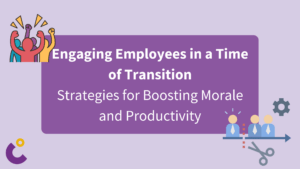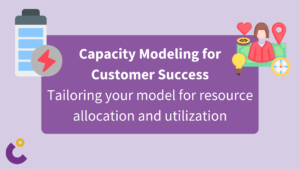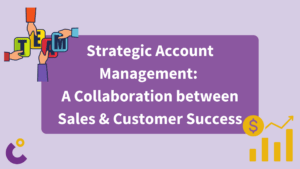

Roles & Responsibilities of a Customer Success Manager
The role of a Customer Success Manager is akin to wearing multiple hats. Acting as both a trusted advisor to their customers and a customer advocate within their organization, CSMs play a pivotal role in ensuring the success and satisfaction of their clients.
The “Spiders” of the Organization: Understanding the Versatile Role of a Customer Success Manager
Our founder, Amy Downs, likes to refer to CSMs as “spiders” – having one leg in every department of the organization, always in service of their customer’s success. They work hand-in-hand with sales, product management, engineering, and marketing on a daily basis. This strategy stems from our mantra of Customer Obsession —an organization-wide commitment to ensuring that we provide the best experience for our customers.
With a keen understanding of their customers’ goals and challenges, CSMs establish themselves as reliable sources of guidance and support. Simultaneously, they effectively communicate customer needs and sentiments internally, driving improvements and fostering a customer-centric culture. In this blog post, we want to delve into the various roles and responsibilities of CSMs, shedding light on their crucial function as trusted advisors and customer advocates in today’s business landscape.
Tailoring Responsibilities of your Customer Success Manager to fit your Business Model
There is no one-size-fits-all when it comes to shaping the Customer Success role. It is highly dependent on your business model and organizational structure, determining the responsibilities of your CS teams. Let’s take a closer look at some of the responsibilities that CSMs might carry, depending on the definition of their role in your organizational structure.
Customer Success Manager as Onboarding and Adoption Guide
Depending on how your post-sales team is composed and organized, CSMs may own the onboarding process for new customers. They ensure a smooth transition after the purchase, guiding customers through the initial setup and providing training and support. They make sure the onboarding is tailored to the customer’s use case and are in charge of introducing self-service resources like your community. Once onboarded, CSMs continue to nurture the customer relationship and drive product adoption. They measure the outcomes achieved with your product and make this value realization tangible for your customers. Your CSMs will be the experts on how your product is used by their portfolio and how adoption could be increased through upsells and product development.
Conducting regular Business Reviews
CSMs conduct regular business reviews with customers to assess their progress, address any concerns, and identify opportunities for growth. This can take the form of frequent check-ins that focus on the operational performance of your product. On a less frequent but regular basis, they dive deeper into a customer’s account in Strategic Business Reviews that focus on the ROI of your product and long-term relationship building with a customer. Both review formats involve analyzing customer data, understanding their key metrics, and collaborating on strategies to maximize the value derived from the product or service. It’s a matter of the customer segments you defined and the according service levels, how often and how deep a CSM dives into reviews with their customers.
Customer Success Manager as Sales Support
CSMs play a crucial role in the sales process by participating in meetings with prospective customers and painting the post-sales journey to those prospects. They provide insights into the customer’s needs, offer product demonstrations, and highlight the value proposition to secure new business. They might take responsibility for evaluating the suitability of the customer’s business case with your product. Leveraging your CSMs as subject matter experts also ensures that the gap between sales and post-sales activities is bridged, and a smooth customer journey is established
Owning the Escalation Management
CSMs take ownership of customer escalations and ensure prompt and effective resolution. They act as the primary point of contact with your customers to address issues. Being perfectly connected across your organization, they coordinate fast resolutions with relevant internal teams and keep the customer informed throughout the process. Following escalation resolutions, a CSM works to restore customer confidence and maintain a positive relationship, preferably even deriving satisfaction increase from the incident.
Customer Success Manager as Trusted Advisor & Product Expert
CSMs stay up to date with the product or service they support and its roadmap. To act as the trusted advisor on your product, they continuously deepen their understanding of the features, capabilities, and updates. With that knowledge, they can effectively guide customers in their adoption and train them on the necessary skills to increase their ROI. Moreover, CSMs leverage their product knowledge to identify upsell opportunities and show additional benefits a customer can derive from their purchase.
Closing the Feedback Loop
CSMs are on the frontline of your business, actively collecting and analyzing customer sentiment. They are the first to hear feedback on customers’ experience with the product, service, or support. As the customer advocate within your organization, they relay this information to the relevant internal teams, sharing insights, trends, and actionable recommendations. CSMs bridge the gap between customer expectations and the organization’s efforts, fostering a customer-centric approach.
Customer Success Manager as Internal Advocacte
CSMs advocate for customer needs within your wider organization, championing customer success as a strategic focus. They make sure to avoid inside-out thinking and constantly put on the customer lens to evaluate the outcome of every customer-facing decision. They collaborate with cross-functional teams to align efforts towards enhancing the overall customer experience. If your business is already leveraging Voice of the Customer insight, your CSMs might be responsible for ensuring that feedback is frequently collected from the right stakeholders. CSMs carry a wealth of valuable insights into the customer perspective and advocate for necessary changes to ensure that the organization maintains a customer-centric culture.
Long story short…
In summary, Customer Success Managers play a crucial role as trusted advisors for customers and customer advocates within an organization at the same time. Their responsibilities include onboarding and adoption, conducting business reviews, supporting sales efforts, managing escalations, staying informed about the product, providing customer feedback, and advocating for customer needs internally. At its core, their role is to ensure customer success with your product or service and drive long-term value for both the customer and your business.
This might also interest you


Beyond Internal Walls: Unlocking the Power of External Customer Journey Mapping

From Map to Magic: Turn Your Customer Journey into Actionable Strategies

Decode Your Customer Journey: A Step-by-Step Guide to Mapping Success

Beyond the Score: Transforming Net Promoter into a Growth Engine – Net Promoter System

Turn Your Raving Fans into a Sales Force: Using Customer Advocates as Your Reference Pipeline

Engaging Employees in a Time of Transition: Strategies for Boosting Morale and Productivity

Capacity Modeling for Customer Success

Data Driven Customer Success

